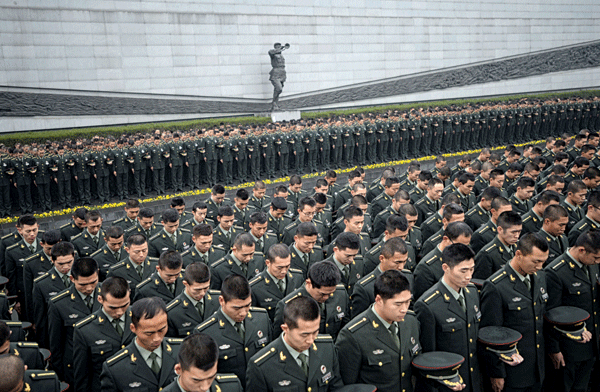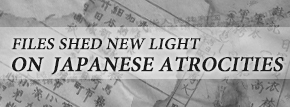Home> News
Nanjing homage day not to plant hatred
By Wang Ping (China Daily)
2014-12-12
 |
|
A symbolic total of 1,213 soldiers remember the deaths of Nanjing Massacre victims at the memorial hall on Wednesday. On Dec 13, 1937, the Japanese army occupied Nanjing and killed more than 300,000 Chinese civilians and unarmed soldiers, according to Chinese historical documents. CUI XIAO / FOR CHINA DAILY |
This Saturday China will observe the first National Memorial Day for Nanjing Massacre Victims following the decision made by the country's top legislature on Feb 27.
China's top leaders are scheduled to attend a state memorial ceremony on Saturday morning at the memorial hall for the victims of the Nanjing massacre.
On Dec 13, 1937, the invading Japanese army occupied the city in Jiangsu province and killed more than 300,000 Chinese civilians and unarmed soldiers, and raped tens of thousands of women in the following six weeks.
This year also marks the 69th anniversary of the Chinese War of Resistance Against Japanese Aggression (1937-1945). China, known for its peace-loving role throughout human history, long suffered from imperialist aggression which began with the first Opium War in 1840. Among all the invaders, the Japanese caused by far the greatest damage to China and its people, with the notorious Nanjing Massacre being the worst example of their brutality.
Rapprochement between China and Japan was within easy reach after the normalization of their diplomatic ties in 1972, especially because Beijing relinquished its claim for wartime compensation from Japan and the China-Japan Joint Statement that followed avoided the word "aggression" in describing Japan's wartime history.
In 1995, the then Japanese prime minister Tomiichi Murayama issued a statement expressing remorse over Japan's wartime invasion and atrocities on neighboring countries. His words helped Japan to improve its relations with its Asian neighbors, including China and the Republic of Korea.
But the end of the Cold War in the early 1990s was also a tipping point in Japan's strategic diplomacy. Although the United States ended its postwar occupation of Japan in 1952, it has maintained its military presence in Japan. As a result, Japan cannot be called a totally independent nation, and rightist forces have kept agitating for stronger military muscle and whitewashing of the country's militarist past. And Washington's "pivot to Asia" policy has served the interest of Japan's hawkish Prime Minister Shinzo Abe.It is this not-too-tacit cooperation between the US and Japan, obviously aimed at containing China, that should serve as a wake-up call for whole of Asia.
By designating the National Memorial Day, China has not only followed an international practice, but also paid tribute to the victims of the Nanjing Massacre. And by commemorating the death of more than 300,000 people, it wants to remind its people of the past, and urge Japan's rightist forces to stop denying history however shameful it might be.
The Abe administration should reflect on its Asia policy, which neither admits the country's wartime atrocities nor abides by previous agreements on peace and cooperation. Tokyo's recent moves such as the re-investigation into the 1993 Kono Statement - the apology rendered by former Japanese chief cabinet secretary Yohei Kono for the use of "comfort women" by the Japanese army during World War II - will only worsen its ties with Beijing and Seoul.
Since China has no intention of spawning hatred against Japan by reminding its people of the bloody past, the National Memorial Day should not be merely seen as a warning to Japan. Instead, the observation of the memorial day reflects China's willingness to rebuild public spirit in East Asia, because regional prosperity cannot be achieved without peaceful co-existence and full awareness of the past.
The author is a researcher in Japan studies at the Chinese Academy of Social Sciences.






